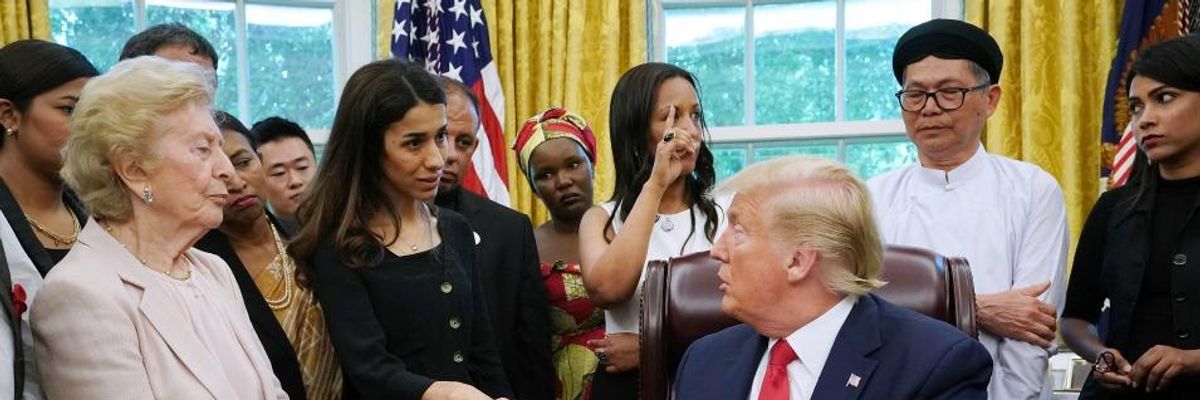Amid outrage this week over President Donald Trump's racist rhetoric and policies regarding asylum seekers and immigrants, critics expressed shock on Friday over two viral videos of the president meeting with several refugees from all over the world in the Oval Office.
One observer on social media accused Trump of displaying a "sociopathic inability to empathize" while another said "he couldn't even manage to have a coherent three-minute conversation" with a Nobel laureate.
Watch:
Trump appeared unaware of the plights of refugees like Nobel Peace Prize winner Nadia Murad, who has campaigned for human rights following her escape from ISIS captivity in Iraq, and Mohib Ullah, one of hundreds of thousands of Rohingya Muslims who were forced to leave Myanmar.
Murad explained how she and thousands of other women were abducted by ISIS when the group took control of parts of Iraq in 2014. The president has spoken frequently about his alleged defeat of ISIS in Iraq, but as Murad explained, "it's not about ISIS" any longer.
"We cannot go back because the Kurdish government and the Iraqi government, they are fighting each other over who will control my area," Murad said. "And we cannot go back if we cannot protect our dignity, our families."
"I hope you can call or anything to the Iraqi and Kurdistan [governments]," she added, telling Trump that French President Emmanuel Macron has been vocal in his support for the Yazidis and their desire to return home.
Murad also spoke about what drove tens of thousands of Yazidis to seek asylum in Germany, as thousands of refugees are currently hoping to be welcomed into the United States while the Trump administration moves to eliminate asylum rights and considers cutting the number of refugee admissions to zero next year.
"After 2014 about 95,000 Yazidis, they immigrated to Germany through a very dangerous way," Murad said. "Not because they want to be refugees, but we cannot find a safe place to live. All this happened to me. They killed my mum, they killed my six brothers."
On social media, critics expressed shock at Trump's apparent lack of knowledge and interest in the experiences of refugees around the world, even as he enacts xenophobic policies to keep them out of the United States.
Some noted that Trump appeared engaged in his conversation with Murad mostly when he inquired about her Nobel Peace Prize, an award that Trump has said he hopes to win and which Murad was awarded for her work combating sexual violence around the world.
After speaking with Murad, Trump turned to Ullah, a member of the Rohingya religious group which was subjected to genocide in Myanmar in recent years. Ullah asked how the U.S. will help the Rohingya return to the country.
"Good afternoon, Mr. President," said Ullah. "I am a Rohingya from Bangladesh refugee camp. So most of the Rohingya refugees are waiting to go back home as quickly as possible. So what is the plan to help us?"
After Trump asked Ullah what country he was from, Ambassador for Religious Freedom Sam Brownback quickly explained that the Rohingya have been expelled from Myanmar, but the president offered no answer to Ullah's question.




